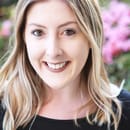Sarah Etheridge-Criswell, a tenured Anthropology professor and Program Director for Bright Water Foundation, tells us all about reaching her dream career! She is living proof that if you do what you love and follow your passions, everything (like your career) will fall into place.
Her Campus: What is your educational background and how has your education shaped your career over the years?
Sarah Etheridge-Criswell: I have my B.A. in Political Science and Anthropology, my M.A. in Anthropology, and my PhD in Public Health. I’ve always loved school and learning and knew I would get graduate degrees. In anthropology, you have to get a master’s if you want to get a job. After getting my M.A. I started teaching as a professor at different colleges in the LA area. I love teaching, but I also like to be active and be in the field. That is why I did my doctorate in Public Health. I merge science and culture to help educate people in developing countries about how to make their water safe to drink. Getting my doctorate helped me earn a full-time tenured professorship and become the Program Director for a non-profit called Bright Water Foundation.
HC: What was your first job out of college and how is that job similar or different to/from what you’re doing now?
SE: Well, after college I spent a semester working really menial jobs (at Blockbuster and as a hostess at an Improv comedy club), but then I moved to California and became a graduate assistant for the dean of Cal State, Fullerton (where I was getting my master’s). This was my favorite job. The dean was awesome and I learned so much of the inner workings of the school. I was also in charge of retention programs for the college, and we specifically tried to identify students who were at risk for dropping out and created programs to help them overcome barriers (language, transportation, financial, etc.). That was really rewarding and actually directly helped me get my full-time teaching job at College of the Canyons in 2015! I always worked three jobs from college until the full-time job, especially since living in California is so expensive. I knew my end goal, though, so I knew that all that hard work in jobs I didn’t necessarily enjoy would pay off in the long run.
HC: Which career fields have you worked in since graduating college? Did you plan on working in these industries when you were a young girl?
SE: Education! I have taught everything, including 1- and 2-year olds at a Montessori school, autistic children, SAT prep for Korean students, tutoring for college athletes, and college courses. Everyone in my family is a teacher (practically) and I always vowed I would NEVER end up teaching! I thought it was a thankless job where you make no money, and I’ve had a lot of experiences where that is true! However, my love of learning made me naturally lean toward teaching jobs, and I immediately discovered how amazingly rewarding it is. However, as a graduate student in anthropology I also got the chance to do a lot of fieldwork; I lived in Indonesia where I took care of orphaned orangutans, I lived in Uganda where I did my own conservation research on chimpanzees, and I worked in Washington with the chimps who know American Sign Language. Being in the classroom is great, but I always have a desire to be out and active in the field, and being able to go to countries and teach people about clean water helps me fulfill that desire.
HC: Wow. So you are the Program Director for Bright Water Foundation. What inspired you to get involved in this non-profit? Did your educational background or passions play a role in you getting involved with Bright Water?
SE: Bright Water is a non-profit organization that provides education and resources for villages in developing countries so they can have access to safe, clean drinking water. When I lived in Africa doing my research, even though I had all these fancy supplies from REI, I kept getting sick from water. My research showed that if I wanted to save chimpanzees and other wildlife, I first had to help people in these areas have better quality of life so they would help with conservation. I decided to focus on water because of my personal experiences and because of its impact on children. That was the focus of my PhD research. When I was doing my last residency I met a retired older man whose goal was to start a clean water non-profit and find someone to run it. It was a perfect match, and I became Director of Programs for the newly created Bright Water Foundation. It’s the perfect way for me to take my knowledge and skills into the field to help people and give back.
HC: What is one fact you wish more people knew about the importance of clean water? Do you teach about the importance of clean water and other public health matters that occur worldwide to your Anthropology students? What other topics do you lecture on?
SE: More than 1 billion people across the globe lack access to safe water and it is responsible for 90% of child deaths under age 5 in these countries. In America we largely don’t have to worry about whether our water is clean. If we do, we can use filters or buy bottled water. In many countries around the world clean water is a luxury that people cannot afford and we need to change this. I teach about clean water in my biological anthropology courses since I merge culture and science in my methods and approach. I also have student research assistants who help me analyze collected data. Last year I was able to take three of these students to Nicaragua with me to help me implement a program in a village called La Calle Real. My biological anthropology lectures and labs focus on cell biology, genetics, anatomy, forensics, primates (my favorite), and human evolution. I also teach one course called Magic, Witchcraft and Religion, which looks at the diverse religious practices around the world.
HC: Would you recommend that college kids get involved in Bright Water or other meaningful non-profits? Why? Were you involved in charity work previously?
SE: I think it is extremely important for college students to become involved in some type of volunteering/nonprofit work. This not only looks great on a resume, but it gives them life skills and unique experiences that will change the way they see the world. My mother and I did animal rescue my entire life, and I began volunteering at nonprofit organizations while in high school. I find it exceptionally rewarding to give back to the community. I try to provide my students with opportunities to do this while in my class. We regularly volunteer at the Gibbon Conservation Center, a sanctuary for small apes in Valencia. I’ve also volunteered with Best Friends Animal Society since 2011, which is how I’ve ended up with 8 pets! My advice is to find something you are interested in and try to help out in that field. It doesn’t always mean physical labor, either. My organization needs a lot of help with our social media presence and blog posts. Other places may need help with photography or data entry. Any way you can give back makes a huge difference.
HC: Do you have any plans for the future, in terms of your education, Bright Water, being a professor, etc.?
SE: Well, I think I may be addicted to school. I plan on doing a graduate certification in genetics from Stanford this summer. It is six courses on a variety of subjects in genetics. I’m really fascinated with this field and I also think it will help me teach the genetics portions of my classes with more depth. I am currently co-authoring a study on STD rates in college students with a colleague who teaches in Orange County, and next semester I am doing an ancestry project with my lab students with 23andMe DNA kits that I hope to also publish.
HC: If you could go back in time and give your college self advice, what would you say or tell yourself?
SE: Do what makes you happy. I was always really interested in Egyptian archaeology but my family really dissuaded me from pursuing that as a career path because they were afraid I would not make any money! It wasn’t until my senior year at college that I started taking anthropology courses for electives and realized that was, in fact, what I wanted to study. Luckily, I was able to complete my political science and anthropology degrees at the same time and I’ve never looked back. If I hadn’t listened to my heart, I would probably not be very satisfied with my career right now. If you love what you do, it doesn’t feel like work and you will find a way to be successful. Secondly, do things to make yourself marketable in the current job market. Volunteer, intern, consider double-majoring, get involved on campus, go on field trips or study abroad opportunities. Basically, make yourself stand out from all the other applicants and show off your unique life skills. I had to work as an adjunct at three different schools for 7 years before I was hired full-time. And the reason I was hired full time (the first time anyone was hired in 8 years) is because I stood out. I had done fieldwork, I had written a book, I had been very involved in campus committees, and I had done unique projects with my students that made the school stand out. But I worked really hard and was able to attain my dream job.
HC: Is it hard to balance being a full-time college professor with being the program director of Bright Water? Do you have any self-care tips for college girls?
SE: It would be if I were not a full-time instructor. I’m lucky in that I teach Spring and Fall and then do Bright Water programs in Summer and Winter. I basically have two full-time jobs, but my teaching gives me 17 weeks off a year, so I can do both. My advice is, while it’s great to get involved, don’t spread yourself too thin. It’s okay to say no to things or to postpone activities if you’re too busy. Manage your time so that you have at least one day per week to relax and do things that make you happy. It’s also so important to eat well, get good sleep, and try to work out at least a few times per week. If you are physically and mentally busy but healthy, you will have a balanced life.


